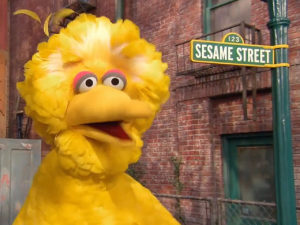Sesame Street tailored for refugee kids
Elmo and Big Bird might soon be bringing smiles and education to millions of refugee children forced from their homes because of conflicts across the globe.
In partnership with the International Rescue Committee, Sesame producers and early-childhood experts are currently consulting and seeking guidance and feedback from relief organisations, trauma experts, academics and others who have worked with refugees.
They will also visit refugee camps to consult with the children themselves and their parents.
According to the UNHCR, of the 65 million people displaced from their homes worldwide, more than half are children.
“I think it’s fair to say there are no more vulnerable people in the world than these refugee families and kids,” said Jeff Dunn, CEO of Sesame Workshop, at a media event in New York this week.
Sesame Workshop’s goal is to develop new content – adapted for a variety of platforms – that will strengthen refugee children’s resilience as well as improve their language, maths and early reading skills.
 The initiative will target children aged 3 to 6 and their caregivers initially.
The initiative will target children aged 3 to 6 and their caregivers initially.
Sesame Street is broadcast in more than 150 countries with many locally adapted versions on air around the world, including in the Middle East.
Sesame Workshop plans to draw on its foreign production partners for support in developing content for refugees.
Sesame Workshop gathered representatives from a range of organisations including UNICEF, Lebanon’s Ministry of Health, the Arab Network for Early Childhood Development, World Vision, the World Bank, Harvard University and Columbia University.
Abby Bucuvalas, Sesame Workshop’s director of international education, said video clips from existing content could address different social and emotional themes.
“Some of the things that we’re really trying to influence are children understanding that they have big feelings and that there are things they can do to manage those feelings or emotions,” Ms Bucuvalas said.
In one clip – about inclusivity – from Sesame Street in Brazil, Big Bird feels left out because he’s too tall to play limbo with the other Muppets. So his friends adapt the game so that he can play too.
But in many places in the Middle East children are still taught to be wary of people who don’t talk like them, don’t look like you or come from a different sect.
With the special conditions facing refugees – including security issues – the group was advised to think carefully about what they would like to teach.
Another issue raised was how to help children understand the stress their caregivers are under.
“It’s very important to explain to children how parents feel about displacement, about losing their homes, about moving to a new country,” said Rabih El Chammay, a psychiatrist and head of the National Mental Health Program of Lebanon.
Sesame Workshop’s executive vice president for global impact and philanthropy Sherrie Westin said absorbing different perspectives would make the content they create stronger.
“Before we really can begin anything in earnest, we bring together advisers from the outside and we try to learn as much as we can,” she said.
A team from Sesame Workshop is traveling to Amman, Jordan and has organised a focus group for Syrian refugees. Children and families will view existing Sesame content and give feedback.
Laurie Nowell
AMES Australia Senior Journalist












